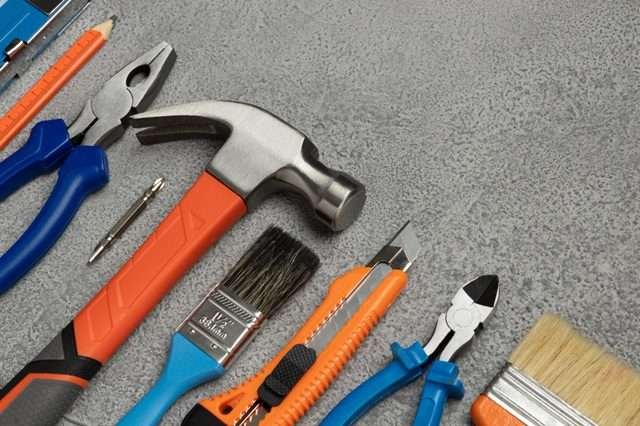Sometimes, home projects can feel like way too much. Even fixing something tiny—like a loose board or a squeaky step—can turn into a frustrating mess if the tools aren’t doing their job. The truth is, most repairs around the house don’t need fancy skills. They just need the right tools.
When the right tool is in hand, even jobs that seem hard become manageable. Suddenly, fixing a fence or hanging shelves doesn’t take all day. There’s no guesswork. There’s no stress. It just gets done—and that feels pretty good.
The Difference a Good Tool Makes
Imagine trying to screw in a bolt using a butter knife. Technically, it might work, but it’s going to take forever and probably hurt your hand. Now, picture using a cordless drill instead. The bolt’s in place in seconds, no struggle at all. That’s what the right tool does—it makes hard things feel simple.
The same goes for every other tool. Hammers are fine for certain jobs, but there are times when they just slow things down. That’s where something like a nail gun can make a big difference. Instead of spending ages hammering in nails one by one, a nail gun does it in a snap. It’s faster, cleaner, and you don’t risk bending nails or smashing your fingers.
If the project involves building a frame, fixing part of a fence, or putting together outdoor furniture, a nail gun is one of those tools that turns a long afternoon into a quick fix. It might seem like something only pros use, but it’s easy to handle once safety steps are followed.
Safety Doesn’t Mean Complicated
Some people avoid using power tools because they’re worried about safety. That makes sense—any tool can be dangerous if it’s not used the right way. But most modern tools are made with safety features that help prevent mistakes.
For example, a nail gun won’t fire unless it’s pressed firmly against a surface. That small feature can keep it from going off by accident. Add in some basic safety habits—like wearing goggles and keeping fingers clear of the tool—and the chances of something going wrong drop a lot.
Reading the instructions and practicing on a scrap piece of wood helps build confidence before jumping into a real project. It’s not about being perfect. It’s about being careful and knowing what to expect before getting started.
Projects That Are Easier Than They Seem
Once the right tools are around, small projects become way easier to handle.
Loose stair rail? A drill and some long screws fix that in minutes.
Wobbly chair? A few well-placed nails or glue can keep it from collapsing the next time someone sits down.
Need a new shelf? With a level, drill, and maybe a nail gun, it can be up on the wall in no time.
Even outdoor jobs—like building a raised garden bed or fixing up the back gate—feel doable. No need to hire someone or wait around. It just takes a free afternoon and the right tools.
And the best part? Each time a job gets finished, there’s a little more confidence to tackle the next one.
Keeping Tools Simple and Smart
Not every home needs a workshop full of gadgets. A few smart choices go a long way. Most repairs only need tools that are easy to store and simple to learn.
Here are some tools that make everyday jobs easier:
- A cordless drill for screws and small holes
- A hammer for light nails and taps
- A nail gun for bigger wood projects
- A tape measure to make sure things fit right
- A level so shelves don’t end up crooked
- A small saw or multi-tool for cutting wood or plastic
These tools don’t have to be the most expensive ones. What matters is how well they work and how comfortable they are to use. Cordless versions are especially helpful because they don’t tie you to one spot or make a mess of extension cords.
Practice Makes Projects Easier
Using a tool for the first time might feel strange, and that’s normal. But after a few tries, it becomes familiar. Putting in a few nails with a nail gun or screwing in a few brackets with a drill starts to feel natural.
Trying new tools on smaller projects is a good way to learn. That way, there’s no pressure. There’s time to figure out what works and what doesn’t. Even fixing a drawer or putting together a flat-pack table can be solid practice.
And the more projects that get done, the easier it is to plan new ones. Hanging up a coat rack or building a planter box doesn’t seem like a big deal anymore.
Why Starting Small Works Best
No one has to build a whole deck on the first try. The goal isn’t to do something massive. It’s to start with something small and useful. Maybe that means fixing a gate that won’t close or adding storage in the laundry room.
Starting small keeps things fun. There’s less stress, and it’s easier to finish without feeling overwhelmed. Each job builds skills for the next one. With time, even bigger tasks—like replacing trim or building a shed—don’t feel so out of reach.
And doing it with the right tools? That’s the part that makes everything smoother.
The Big Takeaway
Fixing up small things around the house doesn’t have to be stressful. Most projects are way easier with tools that help instead of slow things down.
A nail gun can be a game-changer for wood repairs and fast building. A cordless drill makes screws go in quickly. Even something as simple as a level keeps things looking neat and professional.
The best part? Each repair builds up experience. With the right tools, even someone who’s never done a project before can start tackling jobs with confidence.
It’s not about being perfect. It’s about knowing how to get things done—and having the tools that make it possible.

